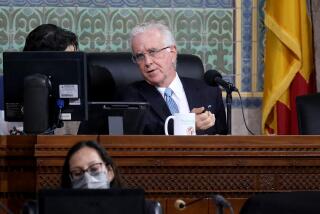Major Reform of City Cellular Use Urged
Acknowledging insufficient oversight, Los Angeles city officials Wednesday recommended sweeping reforms aimed at curbing excessive use of cellular telephones by government workers.
The measures call on city department heads to keep tighter control over who gets cellular phones, how they are monitored and why the expensive calls are being made. They also suggested that the city consider restricting employees to specified sums and prevent them from making long-distance calls.
The reforms, contained in a report more than 40 pages long, were forwarded Wednesday to the City Council for consideration.
“There was no doubt about the need for reform in the area of oversight,” said Councilman Ridley-Thomas, one of four council members who moved to control cellular use after a series of Times articles in January. “But it’s difficult to allege abuse--absent standards.”
The Times, in reviewing thousands of pages of cellular phone bills, found that Los Angeles-area taxpayers had spent more on cellular calls by government workers than people anywhere else in the nation.
Unlike most major U.S. cities, Los Angeles had virtually no system in place to guard against unnecessary business or personal calls. As a result, some monthly bills soared to more than $1,000.
The council committee based its action Wednesday on a study by a task force of staffers from the offices of Mayor Richard Riordan, Controller Rick Tuttle and Chief Administrative Officer Keith Comrie.
Although the task force members criticized a lack of oversight, they said Los Angeles government ranks favorably with other large cities in the number of cellular phones provided to employees. While some municipalities provided as many as 15% of their workers with cellular phones, the figure in Los Angeles was 4%.
The task force report said cellular phones can be valuable resources, especially in emergencies, but “the distribution of this emerging technology has outpaced adequate monitoring of its implementation.”
Because of a “lack of coordinated control,” the report recommends that the billing system be decentralized, making individual departments responsible for monitoring and payment. This, the report said, would build greater accountability into the system.
Under the proposals, employees who want a cellular phone would be required to fill out a detailed form showing why it is needed, including a cost analysis.
Ridley-Thomas suggested that the city’s information technology agency use a “call accounting” system to distinguish between personal and business calls. Cellular phone users would enter a different code depending on which type of call they were making.
The city administrative office said the city should audit cellular usage in six months to ensure that reforms are being followed.
Despite a recommendation by Controller Tuttle for audits to see if improper calls were made in past years, Executive Officer Frank Martinez of the information technology agency said it would take too long.
Ridley-Thomas also singled out the city’s cellular phone service carrier, AirTouch, for criticism, saying the city’s phone bill was high in part because of high rates.
But only this year did the city take advantage of special government contract rates that AirTouch and LA Cellular had been offering for at least two years.
More to Read
Sign up for Essential California
The most important California stories and recommendations in your inbox every morning.
You may occasionally receive promotional content from the Los Angeles Times.










